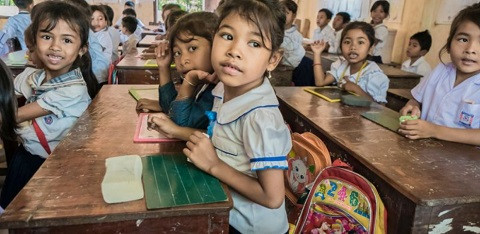
GCED Basic Search Form
Quick Search
Vous êtes ici
Nouvelles

For policy-makers, integrating gender equality into their work and lives is easier said than done. Traditional gender norms are still prevalent across all aspects of society, including workplaces and in the home. Even in the education sector, which has a particular role in shaping and transforming social norms for just and equitable societies through education, persistent negative norms hamper efforts to promote gender equality.
To strengthen education policy-makers’ knowledge and capacities, and mobilize action in the education sector, UNESCO Bangkok recently held the Online Regional Training on Gender Equality in and through Education for gender focal points of the Gender in Education Network in Asia-Pacific (GENIA). Fourteen focal points, nominated by their Ministries of Education from across the Asia-Pacific region, came together twice a week from 8 October to 1 December 2020 to share their experiences and engage with learning content from the UNESCO GENIA Toolkit.
In commemoration of International Women’s Day, UNESCO interviewed three gender focal points who attended the training to learn how they integrate gender equality in their work and lives. Meet Sinith Nham – Deputy Director General of the Policy and Planning Department, Ministry of Education, Youth and Sport, Cambodia; Dockeo Phonthachit – Deputy Director General, Department of Student Affairs, Ministry of Education and Sports, Lao PDR; and Lilian Wilson Tu’ihalamaka – Assistant Deputy Chief Executive Officer at the Ministry of Education and Training, Tonga.
How do you work towards gender equality?
Sinith: I respect and value gender, especially when I develop plans, write reports, and work on projects. Gender equality is being addressed through the implementation of the Gender Mainstreaming Strategic Plan in Education and other national policies and plans. The Master Plan for Capacity Development in the Education Sector also recognizes that an effective education system requires “mechanisms in place to support gender mainstreaming, equity and other cross-cutting issues”.
What are challenges you face as a gender focal point?
Lilian: Not being able to convince decision-makers to include gender issues in education regulations, frameworks, policies, corporate plans, curricula and annual management plans.
Dockeo: I find myself with less experiences in gender equality work. In my limited capacity and analytical skills in gender work, I find it important to gain knowledge from trainings and receive technical assistance from gender experts as to empower myself to work towards advancing gender equality in education sector development.
What are challenges do you face as a woman or man in this field? How has your gender impacted you personally and professionally?
Dockeo: As a mother and my family’s eldest daughter, I am expected to be the family caretaker, taking responsibilities in household decision-making and financial management. I feel so much pressure because I have so many dependents. I have to learn to be very patient. As a woman at work, sometimes my voice is not heard. However, I believe that there are opportunities where I can raise my voice and share my opinions.
Lilian: In my workplace, as a woman I experience not being given equal opportunities to carry out specific roles.
What did you gain from the GENIA Training?
Lilian: I have learned a lot from this training, especially in understanding the terminology, designing and implementing the national education sector plans, and mainstreaming gender.
Dockeo: I have learned a great deal on gender and gender equality and how important they are in education. As an educator, I have increased my understanding that there are opportunities to value gender work in the national education sector development plan, which will guide improvement of gender equality from a grassroots level. I am now more aware of advocating for recognition of gender sensitivity at work and even at home. I hope to utilize the knowledge and experiences from the training to improve my capacity and share with my colleagues at work.
Sinith: What I have learned from the training, especially the sessions on gender mainstreaming strategic plans, localization tools, and training at national and sub-national levels, substantially improving my work.
What is needed to achieve gender equality?
Lilian: Gender equality can be achieved when there is a political will. High-level support is vital in attaining gender equality.
Dockeo: Everyone has the right to receive equal opportunities to access education and basic needs. People need to recognize that gender equality is the responsibility of everyone.
Sinith: We have to educate ourselves to remove negative biases from the socially constructed mental schemes. Recognizing stereotypes and their possible adverse effects is essential for a more efficient appraisal of opportunities.
What advice would you give to your younger self from a gendered perspective?
Dockeo: I would tell my younger self to be gender sensitive to eliminate discrimination and raise awareness among youths to prevent school-related gender-based violence and to promote gender equality.
Lilian: Gender equality is definitely not all about women and girls. It’s about women and men, girls and boys, alike.
Sinith: We have the power to do what our hearts desire and achieve what we want regardless of our gender.
Main Photo credit: ©Shutterstock/Agent Wolf
URL:
